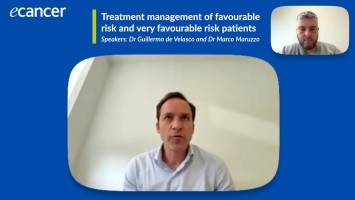We sought to address the challenge of addressing cardiovascular disease in post-treatment cancer survivors. We know that for many common cancers, post-treatment survivors have twice the risk of cardiovascular disease compared to the normal population. Many of them have adverse cardiac risk factors. ASCO and other professional organisations have suggested that all survivors need to have a cardiovascular health assessment and discussion as part of their routine oncology care, so we wanted to find an easy workflow-aware way to make that happen for post-treatment survivors.
I worked with my colleague, Doctor Randy Foraker from Washington University, on the automated heart health assessment tool. What this is is a cardiovascular health clinical decision support tool. It takes information about cardiovascular risk that is in the EHR, combines it with some new information about physical activity and diet that is not ordinarily in the HER, and makes an easy visualisation for oncology providers to use with post-treatment survivors at the point of care.
Because this tool is embedded in the electronic health record, we needed to use what's called a practise randomised design. So we randomised nine oncology clinics, five to the usual care, just delivering their routine post-treatment, survivorship care, and four to have the EHR cardiovascular health assessment tool embedded in their EHR. So we had nine clinics and then we enrolled 645 post-treatment survivors within those nine different clinics.
We asked them, they consented to the study. They came in before a routine visit with their oncology provider. They filled out some baseline information for us then they went right into the clinic, had their regular visit. In some of those clinics, the intervention clinics, the providers had access to the tool and could use it if they thought it was appropriate for the clinical encounter. In the usual care clinics, they didn't have access to the AHA tool. Then when survivors left that visit, we immediately gave them a survey on the way out the door, either by e-mail or in person, and asked them to tell us about what happened in that encounter so that we could understand if cardiovascular health was a point of discussion during the care.
We'll just be reporting on the results from that initial post-visit survey. We are continuing to follow those survivors for up to a year later to find out the long-term effects. We were really thrilled with the results. First off, most importantly probably, both our patients and the oncology providers who participated in the trial thought the tool was acceptable, that it was easy to use. They were glad to have access to that as part of their care. So that's really important for our primary outcome, which was looking at did a discussion about at least one cardiovascular risk factor occur during that post-treatment appointment? We more than doubled the rates in the intervention clinics compared to the control clinics. So in our intervention clinics about 97% of the survivors told us that they had a discussion about cardiovascular health and that rate was only about 50% in the usual care condition.
When we broke that down to look at the number of cardiovascular risk factors that were discussed, for this study there were seven total that the intervention addressed: things like body mass index, physical activity, diet, blood pressure, fasting, glucose. Of those seven risk factors, on average, only about one was addressed in the usual care clinics and there were four times as many addressed in the intervention clinic. So, on average, survivors talked about a little bit more than four with their oncology providers and and that was true when we looked at those individual risk factors across the board. We had 50-60% higher rates of discussions in the intervention clinic compared to the control clinic for all of those factors
What will be the clinical impact of these results?
I'm really excited; this seems to be an effective way to promote this clinical practice guideline of having cardiovascular risk discussions with cancer survivors. Providers who participated in the trial really appreciated having this tool available. The patients also thought it it fitted well with the clinic. So I'm really excited that this seems like a viable solution to helping providers deliver quality care.
In our future work, we're of course going to look at ways to scale this up. So we want to know how could we get more providers using the tool, how could we increase the number of patients that they decide to use the tool for, so that we have greater reach for this intervention.
Using EHR tools is is challenging in oncology and I'm so grateful to the cancer survivors who chose to participate in this trial and provide their valuable information and, most importantly, to our oncology clinics that participated. A really neat aspect of this trial is we used what's called the NCI Community Oncology Research programme to accrue the patients and the practises. This programme is really designed to bring oncology research to the community setting, where ordinarily those patients might not have access to cutting edge research. So, we did this trial in the midst of COVID and at times it was very challenging to recruit patients and providers. So I am so appreciative to both the oncology practices that that took this challenge up in the midst of COVID and the patients who decided to participate.








